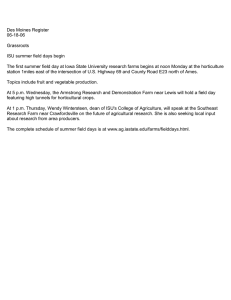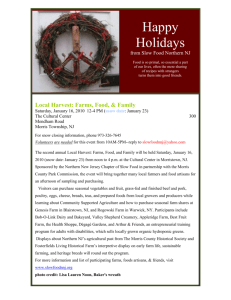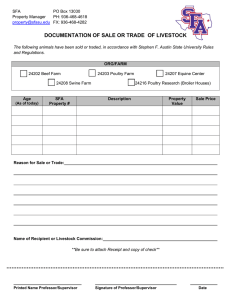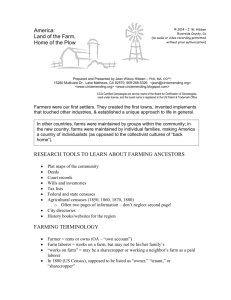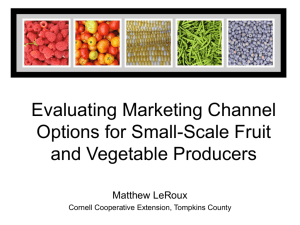BROILER TIP . . . Cooperative Extension Service PHYSICAL SECURITY FOR FARMS
advertisement
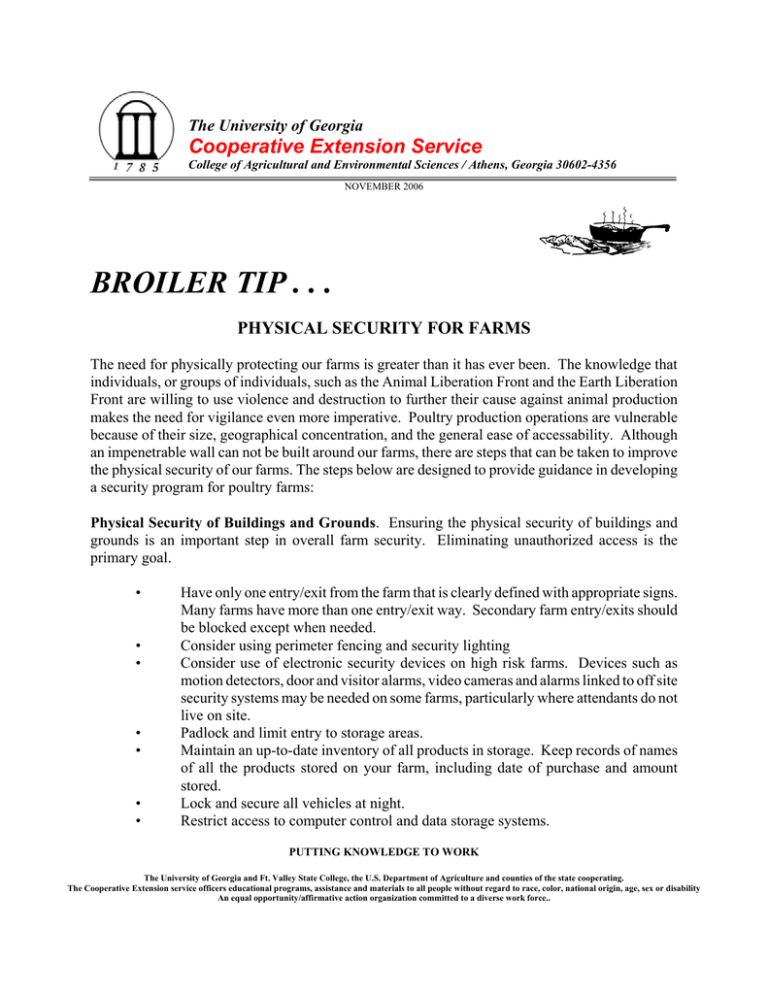
The University of Georgia Cooperative Extension Service College of Agricultural and Environmental Sciences / Athens, Georgia 30602-4356 NOVEMBER 2006 BROILER TIP . . . PHYSICAL SECURITY FOR FARMS The need for physically protecting our farms is greater than it has ever been. The knowledge that individuals, or groups of individuals, such as the Animal Liberation Front and the Earth Liberation Front are willing to use violence and destruction to further their cause against animal production makes the need for vigilance even more imperative. Poultry production operations are vulnerable because of their size, geographical concentration, and the general ease of accessability. Although an impenetrable wall can not be built around our farms, there are steps that can be taken to improve the physical security of our farms. The steps below are designed to provide guidance in developing a security program for poultry farms: Physical Security of Buildings and Grounds. Ensuring the physical security of buildings and grounds is an important step in overall farm security. Eliminating unauthorized access is the primary goal. • • • • • • • Have only one entry/exit from the farm that is clearly defined with appropriate signs. Many farms have more than one entry/exit way. Secondary farm entry/exits should be blocked except when needed. Consider using perimeter fencing and security lighting Consider use of electronic security devices on high risk farms. Devices such as motion detectors, door and visitor alarms, video cameras and alarms linked to off site security systems may be needed on some farms, particularly where attendants do not live on site. Padlock and limit entry to storage areas. Maintain an up-to-date inventory of all products in storage. Keep records of names of all the products stored on your farm, including date of purchase and amount stored. Lock and secure all vehicles at night. Restrict access to computer control and data storage systems. PUTTING KNOWLEDGE TO WORK The University of Georgia and Ft. Valley State College, the U.S. Department of Agriculture and counties of the state cooperating. The Cooperative Extension service officers educational programs, assistance and materials to all people without regard to race, color, national origin, age, sex or disability An equal opportunity/affirmative action organization committed to a diverse work force.. Develop a Visitor Policy. All visitors should check in with a farm representative. This protects against unwanted visitors and also lets people know that controlling traffic on your farm is important. • • • • • Post signs informing visitors where to report and the importance of biosecurity Designate a specific area for visitor parking Maintain records of individuals visiting the farm Do not allow visitors to have unlimited access to farm operations Determine the purpose and need for visitors before providing authorization. Employee Awareness. Employees should be aware of the need for security measures. All employees must be vigilant and understand the importance of monitoring the activities of visitors to the farm. • • • • Check resume and references for new employees Train employees regarding the importance of biosecurity and farm security Train employees to recognize and report suspicious or abnormal activity Train employees with regard to your farms emergency response plan Emergency Response Plans. An emergency response plan can help individuals prepare for and deal with an emergency when needed. Being able to respond to an emergency situation in a timely and calm manor may be the difference in life and death as well as preventing economic destruction. An emergency response plan should contain: • • • A current inventory of all hazardous and flammable products stored on the farm A list of all emergency contacts including flock supervisor, company contact, police and fire departments as well as hospitals A plan for evacuating the farm, contacting law enforcement, securing the scene, and accounting for all farm employees. The unauthorized access to farms represents an important security risk to poultry farms. It is imperative that farm owners and operators take every possible step to ensure the protection of their flocks and facilities as well as the safety of themselves, their family members and employees. Dan L. Cunningham Extension Coordinator Extension County Coordinator/Agent **Consult with your poultry company representative before making management changes.** “Your local County Extension Agent is a source of more information on this subject”
